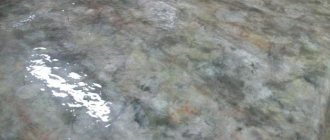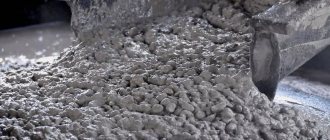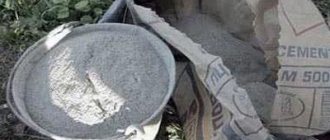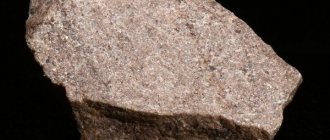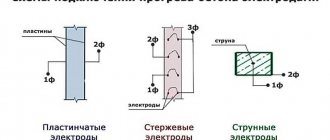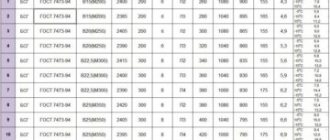Personal concrete plants or mortar-concrete units (RCU) are an asset for modern diverse construction organizations, generating significant profits and providing complete independence from third-party suppliers.
Having individual concrete production, the builder does not depend on delivery times and the quality of raw materials; he always independently makes the necessary adjustments to the plans for construction work and the quality of materials.
| Concrete composition | ||
| By default, the calculation is made using the M100 concrete grade; by changing the numbers in this form, you can make the calculation using any concrete grade | ||
| Cement PC400D20 | tons | |
| Crushed stone 10…20 | tons | |
| PGS | tons | |
| Water | tons | |
| Planned production data | ||
| Fill in the shift capacity for concrete and the cost at which you plan to sell concrete in your region | ||
| Productivity per shift | cube meters | |
| Selling price of produced concrete | rubles | |
| Amount from the sale of concrete taking into account the tax paid (USN) | 2256.00 | rubles |
| Cost of components and other costs | ||
| In this form, fill in the data on the cost of concrete components, electricity, diesel. fuel, site rental and staff salaries that are currently relevant for your region | ||
| Cement PC400D20 | per ton | |
| Crushed stone 10…20 | per ton | |
| PGS | per ton | |
| Water | per ton | |
| Electricity | per kilowatt | |
| Diesel fuel cost | per liter | |
| Rental price 250 sq. m | per month | |
| RBU operator salary | per month | |
| Forklift driver salary | per month | |
| Production manager salary | per month | |
| Technologist salary | per month | |
| Dispatcher salary | per month | |
| Accountant salary | per month | |
| Salary of a repairman | per month | |
| Other expenses (unaccounted for) | per month | |
| Cost of components per 1 cubic meter of ready-made concrete | ||
| In this form, the calculation is performed automatically. Below are the calculated figures for the components that make up concrete per 1 cubic meter of finished concrete | ||
| Cement PC400D20 | 750.00 | rubles |
| Crushed stone 10…20 | 560.00 | rubles |
| PGS | 238.50 | rubles |
| Water | 9.50 | rubles |
| The cost of all components of 1 cube of concrete: | 1558.00 | rubles |
| Calculation of the cost of shift productivity (turnover) and the cost of 1 cubic meter of concrete | ||
| In this form, the entire calculation is performed automatically, based on the data entered above | ||
| Cost of components per shift | 233700.00 | rubles |
| Cost of electricity per shift | 750.00 | rubles |
| RBU operator salary per shift | 2250.00 | rubles |
| Forklift driver salary per shift | 1750.00 | rubles |
| Production manager salary per shift | 2500.00 | rubles |
| Technologist salary per shift | 750.00 | rubles |
| Dispatcher salary per shift | 1250.00 | rubles |
| Accountant salary per shift | 1250.00 | rubles |
| Repairman salary per shift | 1500.00 | rubles |
| Cost of fuel per loader per shift | 1250.00 | rubles |
| Cost of renting a workshop for shift production | 833.25 | rubles |
| Plant maintenance costs per shift | 400 | rubles |
| Cost of workwear per shift | 120.00 | rubles |
| Other unaccounted expenses per shift | 750.00 | rubles |
| Tool costs per shift | 120.00 | rubles |
| Cost of shift productivity (turnover per shift) | 249173.25 | rubles |
| Cost of 1 cube of concrete | 1661.00 | rubles |
| Cost of investment in a concrete plant | ||
| Enter the data you plan to invest in concrete production | ||
| Concrete plant price | rubles | |
| Transportation of the plant to the installation site | rubles | |
| Foundation preparation | rubles | |
| Plant installation, commissioning | rubles | |
| Workwear | 30000 | rubles |
| Tool | 30000 | rubles |
| Plant maintenance per year | rubles | |
| The total investment in the first year of operation will be | 3571000 | rubles |
| Calculation of profit from the operation of a concrete plant and its payback period | ||
| Net profit from 1 cubic meter of concrete | 595.00 | rubles |
| Net profit per shift | 89250.00 | rubles |
| Net profit from a concrete plant for the year | 22312500 | rubles |
| Investments in a concrete plant will pay off in | 40 | shifts |
Calculator for calculating the economic efficiency of a concrete plant
The SMK production enterprise, being a supplier of concrete production plants, instantly responds to the requests of construction organizations, creates and supplies new models of RBU to the market, based on an individual approach to each Client.
The range of concrete plants offered includes products from Russian, German, Turkish and other manufacturers, and equipment for preparing concrete mixtures from the city of the same name is in demand among buyers.
RBU from the Stroy Mash Kirov enterprise are characterized by sufficient reliability and economic efficiency, which allows its purchasers to meet the needs for concrete of any grade and various volumes.
The calculator posted on our website will help you calculate the cost of concrete production, production profitability and payback time for investments in RBU. The computational process is universal and is carried out in several steps. The user, changing the data on the composition of the solution, the price of the components, productivity and the fee for the concrete plant, calculates the numbers he needs. The estimated number of work shifts for 12 months is 250 pieces.
Cost of 1 m3 of concrete of various brands
Ready-made concrete is a popular building material; its scope of application includes pouring structures with different load-bearing capacities: from foundations and floors to screeds. The brand is selected based on its intended purpose, with certain characteristics of strength, mobility, frost and moisture resistance. The quality of the mixtures affects the reliability and service life of the structures being built; it is important to purchase them from trusted manufacturers, preferably in the full volume of cubes at a time.
What determines the cost of concrete?
The price for mortars is determined primarily by their brand. The latter depends on the quality and type of cement, sand and coarse filler, and the presence of special additives in the composition. The introduction of inhibitors or accelerators of setting and hardening, antifreeze and any other impurities increases the cost of one cube from 100 rubles, and the higher the requirements for characteristics, the more significant the costs. Using a higher quality filler with the same strength grade increases the price by at least 10%.
The second significant factor is delivery costs, they are influenced by the remoteness of the construction site, the availability of convenient access, time constraints, and the need to supply solutions on schedule. Delivery prices in most cases are negotiated separately: on the one hand, the larger the purchase volume, the higher the discount; on the other hand, using several cars with delivery by the hour is more expensive. The type of transport used depends on the remoteness of the site and the type of concrete supplied: skinny varieties are delivered within 10 km by dump trucks, their rental is relatively inexpensive, and the body can fit from 15 to 20 cubic meters.
When transporting over long distances (within 10-30 km), a number of covered cargo transport - mixers are used: conventional, with a standard pump and with equipment for lifting the solution to a height, with heating. The possible delivery volume in this case varies from 5 to 12 cubic meters at a time; if it is necessary to transport a larger quantity, several machines are used. In order to maintain mobility for a long time or mix components during the delivery process, concrete mixer trucks are used; on average, delivery with simultaneous preparation increases the price of 1 m3 of concrete by 500 rubles.
The price per 1 cubic meter is also influenced by a number of additional factors: time of year, competition between factories and suppliers, the need to ensure certain characteristics. At the peak of construction work, the cost of the material increases; in winter it can be bought cheaply (by a few%, but the final costs will be high due to difficulties in transportation and compliance with the correct conditions for strengthening). It is advisable to order popular brands in advance; this will save at least 5%.
Approximate prices for different grades of concrete per 1 cubic meter:
| Brand | Class | Mixture characteristics | Price per cubic meter without delivery, rubles | Price with delivery, rubles/cube, within: | |||
| 10 km | 20 km | 30 km | 40 km | ||||
| Filler type: granite crushed stone | |||||||
| M100 | B 7.5 | P3 F50 W4 | 3460 | 3770 | 3910 | 4000 | 4140 |
| M200 | At 15 | P4 F100 W4 | 3710 | 4020 | 4160 | 4250 | 4390 |
| M300 | At 22.5 | P4 F150 W6 | 3910 | 4220 | 4360 | 4450 | 4590 |
| M400 | At 30 | P5 F300 W12 | 4210 | 4520 | 4660 | 4750 | 4890 |
| M450 | At 35 | P4 F200 W12 | 4510 | 4820 | 4960 | 5050 | 5190 |
| M500 | At 40 | P5 F300 W12 | 4710 | 5020 | 5160 | 5250 | 5390 |
| M600 | At 45 | P5 F300 W20 | 5510 | 5820 | 5960 | 6050 | 6190 |
| Filler type: crushed gravel | |||||||
| M100 | B 7.5 | P3 F50 W2 | 3060 | 3370 | 3510 | 3600 | 3745 |
| M200 | At 15 | P4 F100 W4 | 3310 | 3620 | 3760 | 3850 | 3990 |
| M300 | At 22.5 | P4 F150 W6 | 3510 | 3820 | 3960 | 4050 | 4190 |
| M400 | At 30 | P4 F200 W8 | 3810 | 4120 | 4260 | 4350 | 4490 |
| Type of filler: gravel or pebbles | |||||||
| M100 | B 7.5 | Zh4 F50 W2 | 3010 | 3320 | 3460 | 3550 | 3690 |
| M150 | At 12.5 | Zh4 F75 W4 | 3210 | 3520 | 3660 | 3750 | 3890 |
| M200 | At 15 | Zh4 F100 W4 | 3310 | 3620 | 3760 | 3850 | 3990 |
| Bridge concrete | |||||||
| M350 | B 25 | P4 F 300 W 10 with PMD | 4250 | 4560 | 4700 | 4790 | 4930 |
| M400 | B 30 | 4400 | 4710 | 4850 | 4940 | 5080 | |
| M450 | B 35 | P4 F 300 W 12 with PMD | 4600 | 4910 | 5050 | 5140 | 5280 |
| M550 | B 40 | P4 F 300 W 14 with PMD | 4800 | 5110 | 5250 | 5340 | 5480 |
| M600 | B 45 | 5100 | 5410 | 5550 | 5640 | 5780 | |
| Expanded clay concrete | |||||||
| M100 | B 7.5 | D1600 | 3050 | 3360 | 3500 | 3590 | 3730 |
| M150 | At 12.5 | 3250 | 3560 | 3700 | 3790 | 3930 | |
| M200 | At 15 | 3350 | 3660 | 3800 | 3890 | 4030 | |
| M250 | IN 20 | 3550 | 3860 | 4000 | 4090 | 4230 | |
Recommendations before purchasing
The difference per cubic meter can be significant; some factories partially include the delivery service in the cost of the mixtures. To minimize the risk of purchasing low-quality products, it is recommended to buy them with the obligatory conclusion of an agreement; all declared characteristics must be confirmed by a passport.
When ordering delivery of concrete in a mixer or similar transport, it is important to remember that the originals of the relevant documentation with a wet seal are issued for each individual vehicle; to be on the safe side, laboratory analysis of samples taken under the supervision of the driver is carried out.
Measures are being taken to eliminate downtime: the reverse side of the contracts is payment for delays of the mixer at the site in the absence of convenient access or a container for unloading. It is almost impossible to check how many cubes of concrete are in the machine; in this case, everything depends on the integrity of the manufacturers.
Analysis of the profitability of the planned concrete farm
During their work on the production of concrete plants, the specialists of the Stroy Mash Kirov enterprise have accumulated invaluable experience in this industry, which allows us to guarantee our Clients the operation of the purchased equipment without long downtime, the preparation of concrete of various grades and volumes to solve the tasks assigned before production.
To purchase a concrete plant and start producing its own concrete, the Customer must realistically evaluate his investment in the purchase and launch of RBU, soberly imagine the structure of profit from his concrete enterprise, and focus on the payback period of his investments.
The cost of a concrete plant plays an important role in preliminary economic calculations, but it is not the only factor that determines the timing of return on investment. In addition, when calculating the expenditure part, the following costs must be taken into account:
- Costs for starting production, consisting of costs for registration activities, arrangement and commissioning of utilities, equipment of production areas for the placement of units of a concrete production plant.
- Payment for rent of production space and warehouse premises.
- Payment for the delivery of the RBU, its assembly and launch.
- Cost of raw materials: additives, water, crushed stone, sand, cement.
- Advertising campaign price.
- Expenses for repairs, maintenance, wages, taxes and unexpected expenses.
In the calculations, you need to set the estimated duration of daily work (number of shifts) to calculate the cost of 1 m3 of concrete. By setting the sales price of the product (ready-mixed concrete), you can determine the average income from its sale. Next, you can calculate shift profit.
Cost of preparing concrete grade M200 (B15) using Carmix 5.5 XL based on 5.5 m3 output per cycle
Calculation example:
Average cost (as of August 2022) of inert materials and cement with delivery in the Rostov region: Fine aggregate - Quarry sand: 240 rubles per ton Cement grade - PC400: 6500 rubles per ton
Coarse aggregate - Crushed granite: 450 rubles per ton Average cost of ready-made concrete M200: 2800 rubles + delivery 500 rubles
Please insert the required material costs for your region into the table.
Let's calculate the profit we will get by producing concrete using CARMIX for building a house 40 km from Rostov-on-Don:
According to the calculation of the foundation, we will need 220 cubic meters of M200 concrete. The cost of concrete from the factory including delivery: 16,500 rubles for 5 cubic meters (i.e. you need 44 mixers of 5 cubic meters each) Cost for the production of concrete CARMIX = (cost of 1 cubic meter) * (volume) = 2,392 rubles. * 220 cubic meters = 562,240 rub. cost when purchasing concrete at a factory = 44 mixers * 16,500 rubles = 726,000 rubles. Savings on concrete = 726,000 - 562,240 = 163,760 rubles.
DETAILED DESCRIPTION OF THE CALCULATOR OPERATION Let's, using the example of pouring a monolithic floor in a hangar, calculate how much you can save on purchased (imported) concrete. What we are building: a grain storage hangar, dimensions 15x42 m, the facility is located 25 km from the nearest concrete plant. What materials do we use: PC M400 cement Crushed granite Quarry sand Water As a rule, the hangar floor is poured in two stages: the concrete base and the main concrete covering. How much will we spend on concrete if we buy it from the nearest concrete plant? In each city and region, prices for concrete are different. They depend on the quality of the inert materials, the time of year, the distance to which the finished mixture needs to be transported, etc. With the CARMIX mobile concrete plant, the mixture can be produced directly at the construction site and does not depend on the distance of transportation, the quality of the roads along which the concrete will be delivered, traffic jams and markups on the finished mixture. At the first stage of pouring the concrete base, you can use M50 concrete, but we will make calculations taking into account the fact that concrete mixers that bring the mixture from a stationary concrete plant sell concrete starting from grade M-100 (B7.5), which costs an order of magnitude more. . For the main concrete covering, let's take the price of concrete grade M200 (B15). So, the height of the hangar screed is 20 cm. We multiply 15x42x20, we get 126 cubic meters. And the height of the main concrete coating is 25 cm. We multiply 15x42x25, we get 157.5 cubic meters. Let's consider the costs when ordering ready-made concrete at a concrete plant with delivery to the construction site: The price of ready-made concrete is - 2550 rubles per m3 (M100) and 2800 rubles per m3 (M200) Costs for purchased concrete = (126 x 2,550) + (157.5 x 2800) = 321,300 + 441,000 = 762,300 rubles Let's consider our costs when producing CARMIX concrete. Prices for inert materials can vary greatly depending on the region. Average wholesale cost of inert materials with delivery in the Rostov region: Sand: 240 rubles\t Cement: 6500 rubles\t Crushed stone: 450 rubles\t Since you buy inert materials yourself to produce concrete on CARMIX, you can use M50 grade concrete so as not to overpay, so we will count the costs using this brand of concrete. Proportions for concrete M50 (B3.5) Cement - 1 part Crushed stone - 8.8 parts Sand - 5.9 parts Water - 1.4 parts Material consumption per 126 cubic meters: Cement - 16,582 kg Crushed stone - 146,433 kg Sand - 98 127 kg Water - 23,540 liters
| M50 (B3.5) | M100 (B7.5) | M150 (B12.5) | M200 (B15) |
| M250 (B20) | M300 (B22.5) | M350 (B25) | M400 (B30) |
| M450 (B35) | M500 (B40) | M550 (B40) | M600 (B45) |
The calculation is made subject to the mobility of the concrete mixture: P1
ddfvdfv
| Name | Cost per ton + delivery | Required quantity per 5.5 m3 | Cost for production 5.5 m3 | ||
| Coarse aggregate: Crushed granite | rub/ton | kg | 2789 rub. | ||
| Fine aggregate: Quarry sand | rub/ton | kg | 941 rub. | ||
| Cement grade: PC400 | rub/ton | kg | 9113 rub. | ||
| Water | rub/ton | kg | 0 rub. | ||
| Fuel1 | rub/liter | l | 240 rub. | ||
| TO2 | RUB / 1000 hours | minutes | 41.58 rub. | ||
| ZP3 | rub/month | minutes | 75.76 rub. | ||
| Cost of 5.5 m3: | 13200.44 rub. | ||||
| Cost of 1m3: | 2400.08 rub. | ||||
1 We assume that fuel consumption is 15 l/hour. In 1 hour, CARMIX makes 3 batches of 5.5 m3. That is, to cook 5.5 m3 you need 5 liters of fuel.
2 For a period of 1,000 operating hours, the cost of maintenance of the Carmix 5.5 XL concrete mixer (oil change, filters along with work) is 124,750 rubles.
3 Only one operator is required to service the machine. The calculation is based on 22 working days per month, lasting 8 hours.
How much will it cost to pour a cube of concrete?
Before moving on to specific data, we will accept a number of assumptions or initial data:
- Firstly, you can pour concrete in two ways: order the delivery of ready-made material from the nearest concrete plant or prepare and pour concrete yourself using a concrete mixer or a sheet of iron;
- Secondly, the cost of pouring includes the following main cost items: the cost of materials (cement, crushed stone, sand and water) and the cost of mixing, pouring, and in the first case also the cost of delivery of the mixer:
- Thirdly, the specific price data given below are indicative and may change up or down depending on the manufacturer, supplier and region of Russia.
Auxiliary works
During large-scale construction, it is important to take into account many nuances in order to complete it efficiently and on time. For example, when mixing concrete by hand, the price is one, and when using a mixer, the price is different.
In addition to the production of concrete and its delivery, the costs of preparatory and main work are calculated, which include:
- Installation of formwork for future pouring.
- Making a reinforced frame for greater strength.
- Pouring concrete.
In this case, it should be taken into account what the formwork will be. It can be removable, collapsible, or installed without future disassembly. Prices for these works are rarely quoted separately, so it is difficult to trace any system. Most often, contractors themselves determine the degree of complexity of this process and set their own prices.
They can range from 250 rubles per square meter to 1200 rubles per linear meter.
Reinforcement is a mandatory part of the work before pouring. Here the costs of the material are calculated - these are fittings and wire for fastening, welding and consumables. Depending on the choice of installation method, the price may vary greatly. There are three main types of installation of reinforcement cage:
- Hand knitted with wire. A very reliable method, but quite labor-intensive. The cost of such work can reach up to 2800 rubles per square meter.
- Welding work. Here prices depend on which assessment option the welder offers. This can be an hourly payment - up to 1000 rubles or per centimeter of seam - up to 40 rubles.
- Laying the finished frame mesh. To the cost of the finished mesh you will have to add the cost of installation work, usually no more than 250 rubles per square meter.
Having made the necessary calculations, we begin to carry out the main work of pouring concrete.
Concrete production - proportions and cost
Let's estimate the cost of producing concrete at home. As an example, let's consider a conventional recipe for a concrete mixture of average grade m200-m300 and the average cost of the main components necessary to produce a cubic meter of ready-made concrete.
- Cement m500 in the amount of 300-350 kg (0.25 cubic meters). Today, the price of a factory-packed bag of cement (of normal weight, composition and quality) varies from 140 to 200 rubles per 50 kg bag. Accordingly, 6-7 bags worth 1100-1200 rubles will be needed per cube of the mixture. (Don’t forget to add here the cost of delivering cement to the site. Depending on the required number of bags, transportation can add to the cost of 300 or 500 rubles per cubic meter. Unless, of course, you carry bags of cement in the trunk of your car)
- Sand in the amount of 600-700 kg (0.4-0.5 cubic meters). You will have to take more sand than necessary, because they don’t carry it little by little. A ZILok with 4 cubic meters of sand costs an average of 2500-3000 rubles. KAMAZ sand costs 5000-6000 rubles and will bring 8-10 cubic meters. In total, the cube will cost about 500-700 rubles.
- Crushed stone - 1100-1200 kg (0.7-0.8 cubic meters) Everything here is similar to sand. Crushed stone alone costs about 1,500 rubles per cubic meter with delivery. Again, two cubes will not be delivered. You will have to take a minimum batch of 4-5 cubes. In total, crushed stone will add another 1,300-1,400 rubles into the firebox of the cost of a cube of homemade concrete.
- Water - 150-180 liters. Finally you can relax. Water costs us almost nothing. Consider the savings.
Let me immediately note that these figures should not be viewed as dogma. Depending on what raw materials are used, the recipe also changes. For a number of reasons, at different concrete plants, the technology for producing concrete and the proportions of the main components included in its composition may differ significantly.
What do we see as a result of simple arithmetic calculations? Only the components for making concrete with our own hands will cost us approximately 3100-3500 wooden rubles. If you knead it yourself, this will be the final cost. Although your own hands are also worth something :-))) If you are not planning to spend your only weekend or vacation with a shovel and bucket, you should think about hiring outside labor. And this also costs money. A couple of people can mix 3-4 cubes of concrete per day. This show will cost 2000-3000 rubles. Which will add another 500-1000 rubles to the cost of manufacturing a cube of concrete.
In total, the bottom line is that we got the cost of making concrete with our own hands at 3000 - 4500 rubles per cubic meter of mixture. By the way, factory-ready concrete with delivery will cost you 2600-3000 rubles per cubic meter. Well, let's not talk about sad things. Give us the ceremonial first batch!
Types of concrete
Calculating how much it costs to pour concrete begins with the quality of the base material and the composition of the solution. Depending on what these components are, the price of concrete will be.
Even a schoolchild who knows how to multiply and add can calculate the cost of preparing concrete manually. First, determine the required amount of constituent materials to obtain 1 cube of concrete. If you divide it into 10 parts, then the proportions should be as follows:
- sand - 3 parts;
- cement - 1 part;
- gravel - 5 parts;
- water - 1 part.
Now it is enough to take the average prices for 1 cubic meter of each ingredient separately, divide by 10 and multiply by the number indicated in the table. Then add the sum and you get the price of 1 cubic meter of concrete.
As a result of such simple calculations in most regions it will cost from 1300 to 1500 rubles per cubic meter. Somewhere it may be more expensive, and somewhere it may be cheaper. For example, free sand or gravel significantly reduces the price, but not everyone has the opportunity to use personal natural resources.
There is no need to calculate the cost of factory-made concrete, since the supplier determines it independently. However, checking the declared quality and comparing it with the price calculated using existing prices for the components can help you choose the best option.
The price may be influenced by the quality of cement and gravel, as well as special additives to increase the anti-corrosion properties of concrete . When calculating the cost, do not forget that the delivery of materials must also be included in the calculation, otherwise the budget may not be enough for the entire construction.
How much does it cost to pour 1 m3 of ready-mixed concrete from a concrete mixer truck?
You can order ready-made concrete at the enterprise and deliver it in a mixer equipped with a special device for unloading concrete on site.
Table of the current cost of ready-mixed concrete of various grades per 1 m3
| Concrete grade | Mixture class | Price per 1 m3 |
| M100 | B7.5 | 2.80 thousand rubles |
| M150 | B12.5 | 2.90 thousand rubles |
| M200 | B15 | 3.10 thousand rubles |
| M250 | IN 20 | 3.35 thousand rubles |
| M300 | B22.5 | 3.50 thousand rubles |
| M350 | B25 | 3.58 thousand rubles |
At the same time, the cost of delivering the material by fuel mixer truck should be added to the “tabular” cost of a cube of concrete. At this point in time, the average delivery cost ranges from 1.2-1.5 thousand rubles, depending on the amount of material delivered.
Thus, pouring 1 m3 of “purchased” concrete M300 will cost 3,500 +1,200 =4,700 rubles, or 2,190 rubles more expensive (4,700-2,510) than when mixing the material yourself. There are very significant cost savings. However, it must be borne in mind that kneading concrete with the muscular strength of the hands is a very difficult and unproductive process.
When is it recommended to make concrete yourself?
Ready-mix concrete is the simplest and most effective choice, but there are situations when the concrete mixture needs to be made directly on the construction site and then there is only one way out - to carry out the mixing process yourself. So, in what cases is it better to do it yourself:
- A small amount of concrete mixture is required. At the same time, the option of delivering it with a mixer is irrational in financial terms or even impossible, since the minimum volume with delivery, as a rule, is at least 5-7 cubic meters.
- The work process proceeds gradually, in such a way that it is not possible to perform one-step concreting. For example, this could be pouring multi-tiered reinforced concrete structures or individual crossbars, etc.
- It is difficult to deliver a concrete mixer or concrete pump to the site due to the lack of suitable transport conditions or the construction site is located in an old building.
